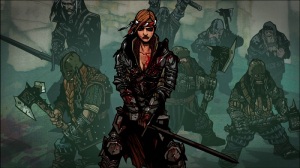Potential spoilers: Dragon Age, The Witcher.
Despite donning a different role in the various games I play, I find that when faced with the option of subjugating someone, or siding with those who hold systemic power, I always pause. Recently replaying the recent BioWare RPGs and The Witcher series, it struck me how I could not side against the Scoia’tael in the latter, nor could I find myself wanting to side against the mages in one of the former. Something in me innately wants to rebel against the notion of further subjugation, regardless of whether it would be part of my character or not.
What seems like a fairly simple observation began when I started comparing The Witcher to Dragon Age, as I have seen many do. There are arguments about better combat systems, a character with whom to identify, a better world, and more powerful decision making. The arguments go back and forth both ways, though that last point struck me as interesting, because there is systemic racism that is apparent in both games. Yet, when I looked at my import from the first Witcher to its sequel, my decisions barely had any consequence. Then I recalled the end of Dragon Age II and realized why that was.
A story that a game metes out is a system in and of itself. The world that has been built is tied into that story (as well as the mechanics for progression; it so happens that in these two franchises, violence is rampant), and the only true way to have any effect is to change that story itself. Importing decisions means that any decision I make in a game will be of limited scope. I can side with the Scoia’tael all I want, but that won’t change the fact of their oppression, or the plight of the various elves and dwarves found wandering that world. In Dragon Age II, it is Anders’s reckless act of blowing up the Chantry in Kirkwall that allows BioWare’s writers to move the circumstances surrounding the oppression of mages forward, nothing that my Grey Warden did in Origins, nor any decisions I made in the sequel.
What strikes me about this is that it is an interesting parallel for effecting social change in real life: until the narrative changes in some significant way, all the work is merely a build up toward it. Of course, in these games, these acts happen no matter what, meaning my choice of whether to be for or against such large-scale changes colors which side I am on and how I would perceive such. Looking at the US right now, depending on how one feels about same-sex marriage, all of the seeming progress that is occurring right now means there are a range of reactions and emotions, based on peoples’ own actions and efforts in that struggle.
Which is to say, my hesitance in siding with the humans against the Scoia’tael has a clear impact in that the Geralt I play would clearly have a role in my mind, and would clearly have a mindset on how to approach decisions (granted, this one is alien to me, which is why I have not gone that route yet, despite some arguments that ‘both sides are just as bad,’ which is an argument at which I reflexively roll my eyes).
These are games that are built on decisions, and people seem disappointed when the decisions do not lend themselves to larger changes that carry over from game to game, or even from decision to decision in the same game sometimes. But, if we allow ourselves to inhabit the characters that would make such a decision, it does allow for a narrative to be constructed. These types of games are a collaboration of the players’ imaginations and reasons with the story being told.


